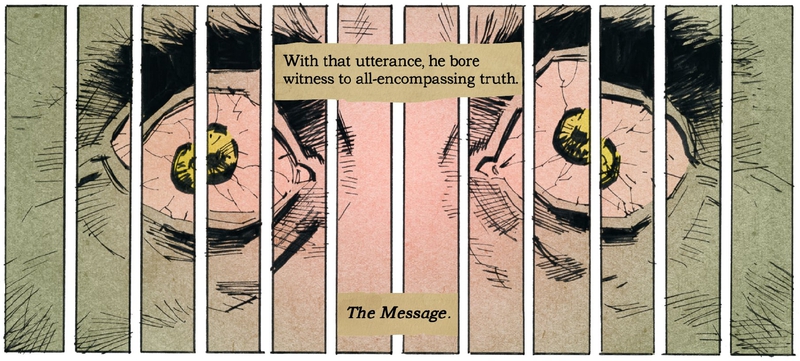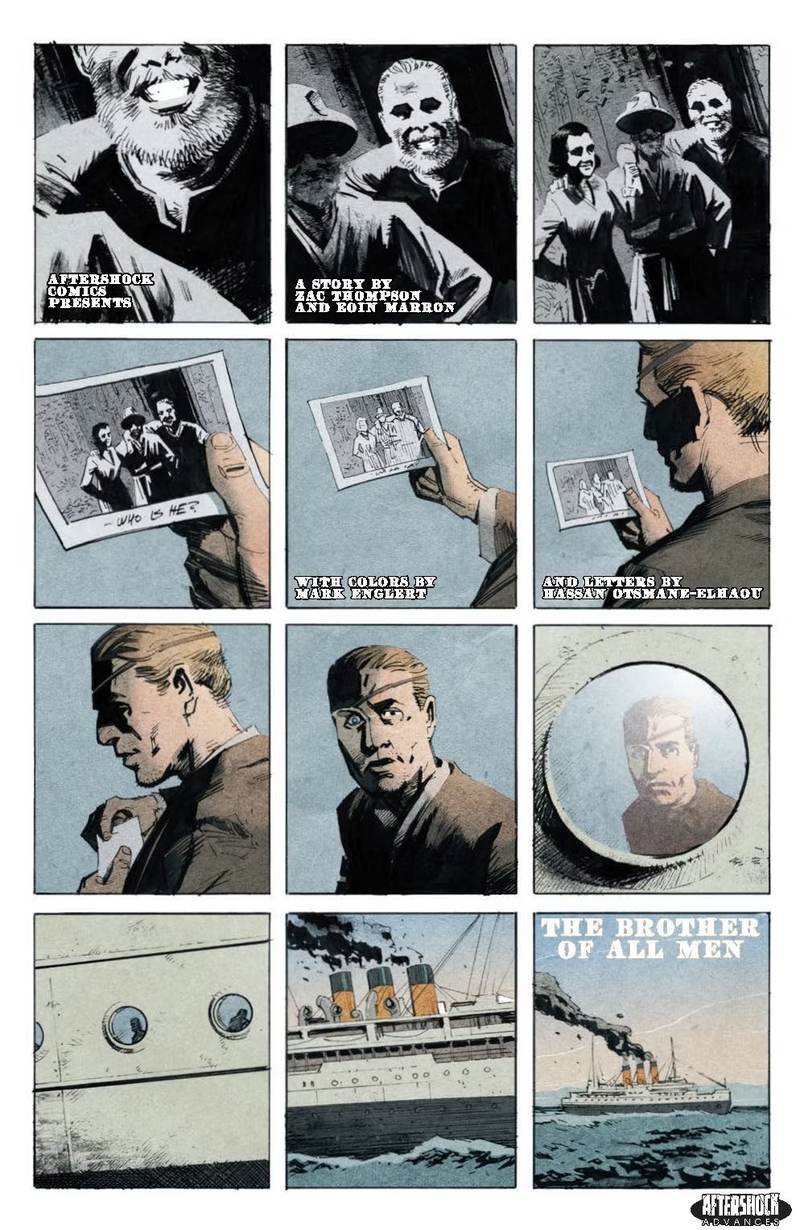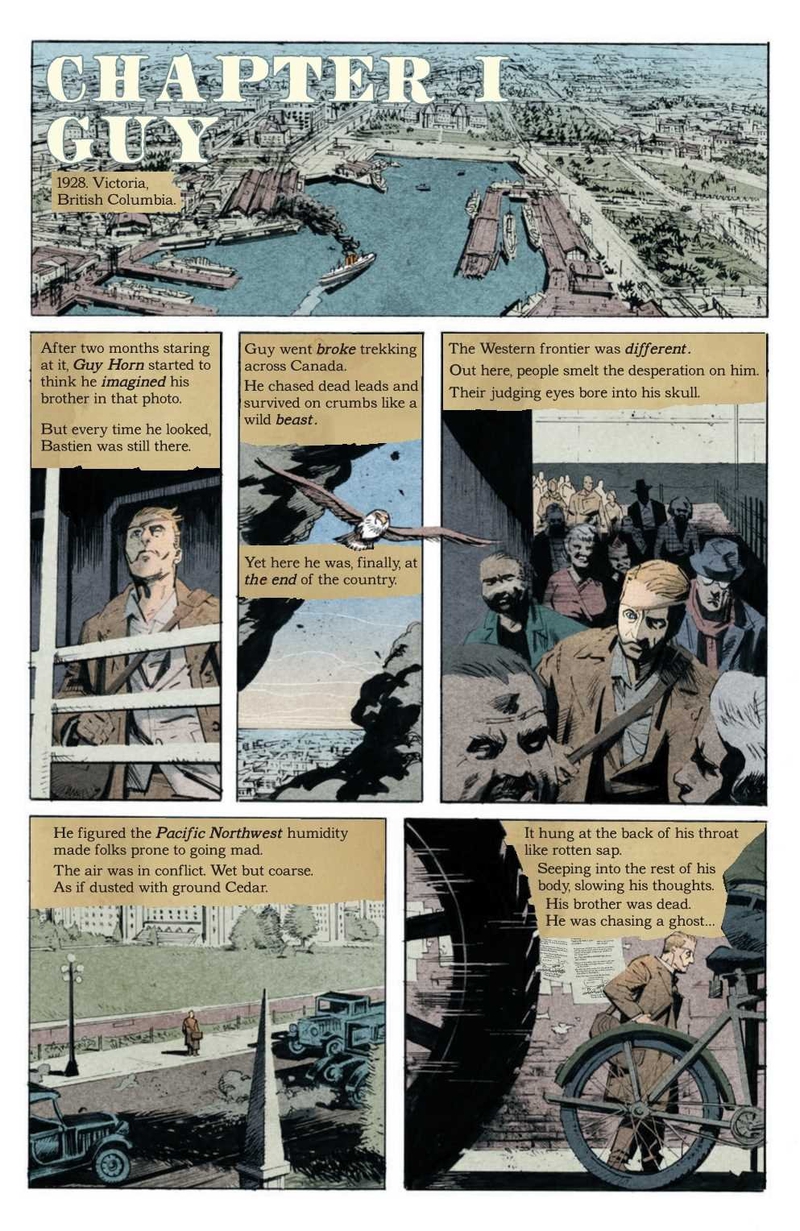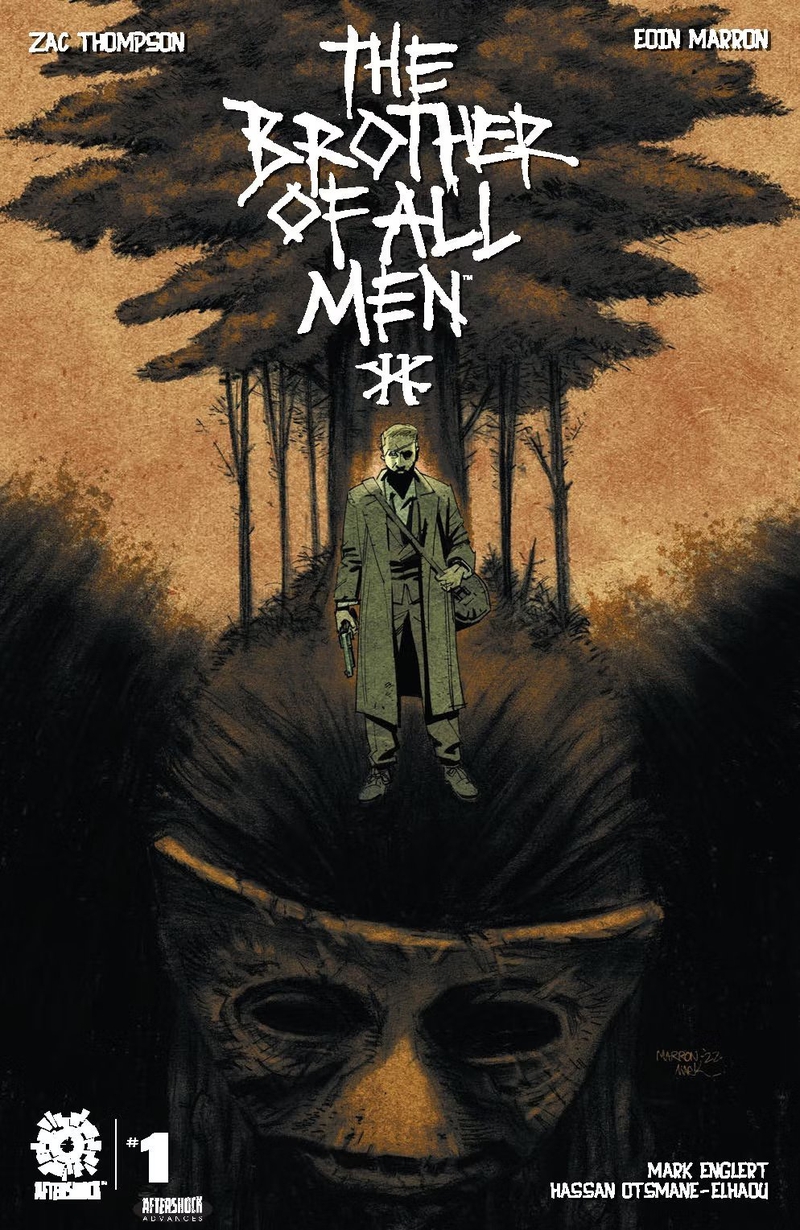Zac Thompson (Undone By Blood, Lonely Receiver, I Breathed A Body) is taking his first foray into realistic fiction with his latest comic, The Brother of All Men. It's a horror/noir story that deals with a real cult from Post World War I Canada. We dove into some of what went into creating this comic, its Canadian identity, and more with Zac below.
What made you want to deviate from fiction to write a realistic fiction of this nature?
Zac Thompson: I've always been fascinated by Canadian history. We're a country with a lack of self-identity, in that a lot of people (outside of the country) don't really know much about us, and we don't have many stories we tell about ourselves. We're always a stand-in for somewhere else. In a way, my work in body horror is really me trying to continue the tradition set by Canadian-icon David Cronenberg. This departure into folk-horror and neo-noir was born out of a challenge to myself and an attempt to do something very different with Canadian aesthetics. One of Canada's most iconic features is our landscapes and nature. Folk horror is a genre that is heavily rooted in place and tradition. So I wanted to bring a little bit of that flavor to Canadian history and tell a story about the country I love, but unlike any we've seen before.
With Brother XII being a person who existed, how do you approach writing him as a character?
It's tough. Really tough, if I'm being honest. I think part of writing someone like him is coming at it from a place of empathy. Trying to understand what made him the man he was without pulling any emotional punches. While also trying to understand how he got people to follow his every word. Which is to say, it was important for me to go back and do all this research about who he was before he came to Canada, to read a lot of his "philosophical" writing, and try to understand why he may have formed the cult in the first place.
In the end, I didn't want any of that to be on the page. He's a monster, through and through. But like most cult leaders, he was charming and witty. So it's striking the right balance between showing readers those charms and revealing the sinister man beneath in moments of quiet or weakness. The first issue is all about the show, the charming man who invites us in. But as we get closer to him and start asking more questions, the cracks in his facade start to form. We get to see him as the ruthless, scared, demagogue he really is.

What was your research like for this story? Were you able to visit any of the locations?
When this story was originally conceived and mostly written, I was living in Vancouver, British Columbia. I lived there for a decade. All throughout that time, I traveled to and from Vancouver Island (where the book is set) for vacations, camping trips, hikes, etc. I spent a lot of time fully immersed in nature there. So the mood of the whole book, the aspects of feeling completely dwarfed against the awe-inspiring landscape you're standing on, is all from personal experience.
I wanted to capture that sense of deep time you get when you're on a mountain and realize you're basically nothing to this place. But there's also this wacky nature to BC where weirdos, magicians, and occult truth seekers seem to flock to the pacific northwest. I spent a lot of time paying attention to the people I met out there. Especially those who settled from elsewhere or those who came looking for enlightenment. There's a particular sense of being "in" a place that you can't recreate unless you go there and just let yourself be there, if that makes sense. So, yeah, there's a lot of me and my time in BC in the book. Now that I've moved to the opposite coast, I find myself longing to be back in the pacific northwest. Like there's a strange beacon calling to me, and I can't ignore it for much longer.
With the story having real-life victims, do you approach writing with more sensitivity in mind than you would your own fictional creations?
Definitely. Any time you're dealing with real history, it's a very tricky thing. I gave myself a rule that if I used a real person in the narrative, then we were telling their story. As in, it was a disservice to highlight them and not show exactly how they were screwed by Brother XII. So while there are real people within the narrative, I made the decision to invent Guy and Bastien as a way to talk about all of the dangers of falling into a cult while still being able to tell a story.
Because this is still a genre story. It's still a horror story. It's still a detective story. So it was important to have characters who could behave in unpredictable ways and channel some of the experiences of others who fell under Brother XII's influence without doing a 1:1 recreation. When writing about real people and real history… sometimes things just aren't that interesting from a storytelling perspective. Either the events are anticlimactic, lack any real resolution, or people get bored and move on. But their emotional experiences are really powerful. So I tried to take as much of that and tell those stories through Bastien and Guy. They carry the emotional burden of the victims, and it's through them we're able to experience that catharsis.

What went into building your main character, Guy?
Guy [pronounced Gee] was someone I spent weeks creating. To be honest, he's this strange fictional version of my grandfather, who unfortunately passed away before I was born. His name was Guy, and he was this fiery French-Canadian that lived in Montreal most of his life. Using that as a launchpad, I began filling out the fictional history for my Guy. Looking at what it would've been like to be a French-Canadian growing up in Montreal. What it would've been like to be French-Canadian in the military during WWI. During that time, most of our forces in WWI were British settlers.
Anyway, giving Guy an identity outside the norm allowed me to build out his POV on Canadian history. It also allowed me to place him in a very specialized contingent of soldiers during WWI, so I knew every single battle he fought in, where he got injured and what conditions were like for that group of soldiers. So when I say he's "tuned to the dance of the dead", it's that he's been surrounded by death and destruction for most of his time overseas. After the war, he spent a few years in France getting reconstructive surgery. But when he came back… he found himself unable to adjust to peacetime. War completely ruined him.
What made you want a disabled veteran to be at the forefront of your story?
Broadly, there's an underrepresentation of disabled protagonists in fiction. Especially characters that are not defined by their disability. I think this feels even more true in the horror genre. I've spent my whole life around disability and have experienced firsthand the ways it marginalizes people. In a lot of ways, the Great War was this catalyst toward better disability rights in Canada. Because "war wounded" coming back had such an awful time reintegrating into society, for a number of reasons that are too long to list. Needless to say, I think it was key for Guy to feel like he was this discarded person. Someone who ostensibly felt forgotten or like they didn't fit in, who was still looking for meaning and hadn't come to terms with their injury. Not because they lacked character but because society wouldn't afford them dignity or opportunity. So on the face of it, Guy seems like the perfect candidate to fall in with a cult.
Working with Eoin on Guy's design helped cement these themes. Eoin's a brilliant storyteller and brought this level of intensity to Guy's face that gives him this weary, exhausted feel in every panel. He really elevated the idea of the prosthetic mask. And visually, that recurring thread of people wearing masks is repeated in that first issue to great effect.

In post-World War I Canada, most citizens were in a lot of turmoil. Do you find in times like those, cults have a better chance of thriving?
Absolutely. Without question. If you look at the big cults of the last sixty years, they're all happening pretty much concurrently with some greater political unrest or institutional failure. I think when people start to lose faith in the systems they entrusted with their life or livelihood, they turn elsewhere for answers. It's in that uncertainty that cult-leaders like to rear their heads and take advantage of unrest. If you can create compelling questions about why things are failing within whatever one defines as a broader "society," you can create space for an alternative. You can create thought-terminating cliches, you can create an "other" and a system of strict control that allows you and trusted others to ascend above the turmoil and bullshit.
In your mind, what draws someone to a cult as a follower?
It's a desire for control. Either to be controlled or to assume control of your own life, or more broadly, the world. More interestingly, cults seem to attract people who haven't exactly struggled too hard in life and yet still feel shortchanged.
What aspects of the story and the history itself of Canada set it apart from something that took place in Europe or America?
I wanted to ensure the Pacific Northwest was a character just as much as the cult. From all of Brother XII's writing, he describes the prospective location of his settlement as "a wondrous land surrounded by trees," and frankly, that's British Columbia. It's an utterly gorgeous and vast space where you can walk down a small wooded path and find yourself completely isolated on a beach at the end of the world. It's awe-inspiring, and Brother XII's beliefs were deeply tied to this communal relationship with nature. Which is something I myself deeply believe. So it's something that I'm really interested in exploring in the book because it's not an inherently evil ideology. Like most things, it was just corrupted by a greedy personality.
You describe Canada as "a nation defined by annihilation." Have recent Canadian events like the discovery of mass graves at a former residential school in Kamloops influenced the book's tone at all?
Ahh, yeah. Absolutely. I think part of being Canadian is acknowledging that this country was founded on the genocide of the first nations that were here long before the English and French arrived. There's also a huge history of Canada being a country of resource extraction. The joke is something like our country is actually just several resource extraction companies in a trenchcoat. Mining, cutting down trees, overfishing.
Both genocide and resource extraction fit under the umbrella of annihilation. We're only beginning to reckon with that history now, but it's always been a part of Canada. It's indivisible from who we were. This country has ghosts lingering on every landscape, and I wanted The Brother of All Men to help channel that anger and rage I've been feeling about the history of my country.
Canada itself was left devastated after WWI with casualties over 65 thousand for Canada alone, not including the losses from the Newfoundland who joined the confederation in 1949, who's Royal Regiment lost nearly 80% of their troops in one battle. How do you think that changed the entire identity of the nation? How much of that comes into play in the story you're telling?
I think it deeply changed our identity as a nation. Like I said earlier, most of the men who fought in WWI on the side of the Canadians weren't exactly Canadian. They lived here, they fought for the country, but it was really on behalf of the Queen. The post-war period is interesting because Canada was a country in search of itself. There was very little future offered to those that returned from the Great War. Factories were changing the layout of the country and leading mass urbanization. Wages were stagnating and people were getting really fed up. The rich were getting richer (thanks in part to rum running and American prohibition), so inequality was at an all-time high. People didn't really have a good idea of what it meant to be Canadian. So as much as Guy is looking to solve the mystery of himself, the country was also looking for meaning. That's why it was so fascinating to me that Brother XII reared his ugly head during this era. He took advantage of this tension in an effort to lure people into his movement.
Are the rituals and traditions depicted in the book exaggerated or based on events that took place on the island compound of the Aquarian Foundation?
There's a ritual at the end that was entirely made up by me. Sorry. Haha. It has a more symbolic and thematic connection to the story as a whole and really allowed me to thread the needle as to what Brother XII's true intent is. But, that isn't to say that the traditions you see in passing weren't practiced by the Aquarian Foundation. There was a strong emphasis on astrology among the members, along with a focus on the intrinsic value of hard labor. Most of the language used in the book is close to real speeches from Brother XII. As well as "The Work" you'll see in the later issues is an embodiment of what they were there to do. The thought-terminating cliche "Trust the work" is real and was used all the time in the cult. As much as Cedar-By-The-Sea seems like this wonderful little village, someone had to build those buildings, cut down those trees, and do all the hard labor to assemble it. It wasn't Brother XII doing all that work…
Brother XII escaped any punishment with rumors he faked his own death. As someone who has spent time learning a lot about the man, do you think this is a possibility?
Brother XII was a snake. I believe he definitely didn't die the way his death certificate said. Everything about the man was a fabrication. So I don't think that would've let up. He was always telling tall tales about himself and spinning complicated yarns. I've been toying with the idea of revisiting his life after this book because there's so much more story to tell, but it's hard… once he disappeared, not much is known about where he went or what he did.
What was the collaboration like with the rest of your creative team on the book?
I'd be remiss if I didn't talk about the team on this incredible comic. Eoin Marron's been a dream collaborator on this story. His lines are loose, and his inks are dirty, but his storytelling is absolute perfection. There's a real sense of grit on his pages, and the natural beauty of the Pacific Northwest is captured so perfectly. I couldn't be more thrilled to work with Eoin in telling this story. We set out to do a neo-noir entirely outside, and he's created something that elevated every aspect of my scripts.
Colorist Mark Englert brings lush, natural tones to everything that really evokes the feeling of being out in nature. He's crafted such a unique look for the book that brings everything to this wonderful ethereal place that feels soured in one chapter and absolutely lush with natural beauty in the next. And letterer Hassan Otsmane-Elhaou is a longtime collaborator who goes above and beyond on every page. The third-person prose narration has this pulpy, novel-esque feeling that pushes the book beyond its inspirations. While the heavy shadows on all the speech bubbles really give everything this noir weight. I'm truly surrounded by the best team I could ask for.

The Brother of All Men #01 and #02 are now available.






